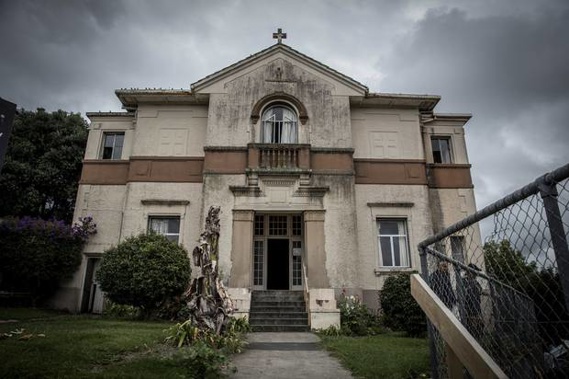
A man living at a notorious Auckland boarding house lay dead in his room for eight days after using synthetic drugs before he was found by his landlord.
The death of Isimeeli Lutui Fonua is one of 10 found to be the result of synthetic drugs by Coroners around New Zealand this year alone.
And there are currently about 50 other fatalities that the coroner's officer says "provisionally appear to be attributable to synthetic cannabis toxicity".
Fonua, 51, was found dead in his bedroom at St Joseph's Lodge on Great North Rd in Grey Lynn on April 16.
The lodge was a former Auckland convent-turned-boarding-house and was described last year by councillor Mike Lee as "a slum in the heart of the city".
The 1626sq m site was sold recently for $4.1 million.
Auckland Council last year served health notices on the then owner, who was given a month to fumigate the building and arrange for cleaning and repairs.
About 20 tenants lived in the boarding house at that time.
It has since been shut down.
Fonua had lived at the boarding house - in room 21 - since 2009.
On April 16 the landlord was asked to check on Fonua by another resident, who was concerned because she had not seen him for "some days".
The landlord used a master key to enter Fonua's bedroom and found the unemployed man dead.
Police were called and after a scene examination was completed of Fonua's room - which was locked and secure before the landlord entered - referred the death to the Coroner.
Officers found a small zip lock bag of "plant material" which was sent away for forensic testing.
They also found a can which looked like it had been used to smoke synthetic drugs.
Fonua was formally identified through his fingerprints, and a post mortem was carried out.
It was established that he had AMB-Fubinaca in his blood.
AMB-Fubinaca is a dangerous chemical - usually manufactured overseas - that has been found in the majority of synthetic drugs seized by New Zealand police and tested by forensic scientists.
The plant material taken from Fonua's room also tested positive for AMB-Fubinaca.
Coroner Katherine Greig ruled that his death was directly caused by synthetic drug use.
She did not open an inquiry into his death, rather ruled on its cause.
"Based on the evidence I am satisfied that his death occurred on or about 8 April 2018,"
she said.
Details of Fonua's death will be provided to a joint Coroner's inquiry into a number of deaths where the fatal drugs were a factor.
The Herald has also been provided with two other Coroner's reports into synthetics-related deaths that until today, have not been published.
Gregory Vincent Stephens died from a cardiac arrest soon after taking synthetic drugs on May 24 last year.
Two days earlier the Pukekohe labourer had collapsed on Queen Street in Auckland's CBD and was rushed to hospital.
He was placed on life support and when the treatment was withdrawn he passed away within minutes.
A post mortem revealed Stephens' cardiac arrest was due to AMB-Fubinaca intoxication.
Coroner Debra Bell ruled that synthetics were a factor in his death.
Stephens had been arrested on May 18 after he was involved in a fight, and held
overnight in a detox cell.
He received a formal caution for fighting in a public place.
Coroner Bell said police investigated their handling of Stephens in custody and was satisfied that no "actions or inactions" by staff contributed to his death.
On September 9 last year Walter Dean Matatia Kaitai died in Porirua.
The 34-year-old had a history of using synthetic drugs, which caused him to suffer a fatal coronary artery thrombosis.
Coroner Peter Ryan said Kaitai, who had no known medical issues, left the home where he lived with his family at around 5pm and went to the Waitangirua Mall.
"He appeared his normal self at the time," he said in his report.
"A friend of his spoke to him outside mall and as he went to walk into the mall he noticed
Kaitai suddenly collapse to the ground and appear to have a seizure.
"An ambulance was called, and resuscitation attempts made, but Mr Kaitai could not be revived."
Coroner Ryan said synthetic drugs were found in Kaitai's system.
"This is consistent with evidence provided [to the Coroner] that Mr Kaitai had a history of smoking synthetic cannabis."
He ruled Kaitai died of natural causes but that synthetics were a factor.
Like Fonua, the deaths of Stephens and Kaitai were not subject to any coronial inquiry as the respective Coroners were satisfied that their deaths were synthetics-related.
Last week the Herald reported on Coroners' findings into the deaths of Taupō man Isaiah Terry McLaughlin and Shannon James Thomas Coleman-Fallen from Rotorua.
Both deaths were directly linked to synthetic drugs.
Other deaths that have been found to be directly linked to the use of synthetic drugs include:
• Nicole Charlotte Graham, Lower Hutt, July 13, 2016
• Toa Rangatira Joseph Tuau, Hamilton, July 20, 2016
• Andrew Brian McAllister, Hamilton , August 17, 2016
• Bradley James Renata Wahanui, Feilding, September 7, 2017
A number of other deaths remain before Coroners.
On September 1, 2017, father-of-one Calum Jones died at his Henderson home.
Jonathan Gordon, 23, was later sentenced
to community detention and supervision for supplying Jones with the synthetic drugs.
Days after Jones died, West Auckland cousins Marilyn Makikiriti and Junior Taneao diedafter using synthetics.
Makikiriti's brother Isitolo Roimata Douglas Uritua - also known as Chris - was charged with two counts of supplying a psychoactive substance in relation to the deaths.
Following an inquest into a recent synthetics related death Coroner Gordon Matenga made a number of recommendations in a bid to prevent further fatalities.
The recommendations were based on the expert evidence of Dr Paul Quigley.
"Dr Quigley suggested an all-encompassing harm-reduction approach which reduces demand, supply and easy access to treatment for those seeking assistance should be developed," the findings stated.
"Dr Quigley submitted that efforts should be made to inform users of synthetic drugs, their families and associates, of the dangers of synthetic drugs and the need to get help immediately if someone collapses
"Dr Quigley's advice for the families or associates of synthetic drug users was that if a person who has had synthetics collapses, that person should be immediately shaken to attempt to rouse that person.
"If the person rouses, that person should be placed in the recovery position and a call for help should be made.
"If the person does not rouse, then call for help and commence chest compressions … do not delay."
The Psychoactive Substances Amendment Bill, which would increase the maximum jail time for supplying synthetic drugs from two years to eight years, passed its second reading in Parliament last month.
Take your Radio, Podcasts and Music with you









